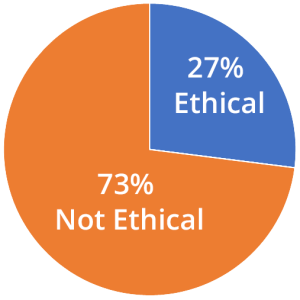This is the August 2023 edition of our monthly series of Ethics case studies titled What Do You Think? This series is comprised of case studies from NSPE archives, involving both real and hypothetical matters submitted by engineers, public officials and members of the public.
Your peers and the NSPE Board of Ethical Review have reviewed the facts of the case as shown below. And, here are the results.
Your opinion has been registered for the August 2023 edition of our monthly series of Ethics case studies titled What Do You Think?
Your vote is recorded as:

Want to know how your peers voted? We’ll send you an email with the poll results on August 22.
Your opinion has been registered for the August 2023 edition of our monthly series of Ethics case studies titled What Do You Think?
Your vote is recorded as:

Want to know how your peers voted? We’ll send you an email with the poll results on August 22.
A Review of the Facts
Engineer Sam is a candidate for the state legislature from a district in which there is a substantial percentage of unskilled workers who are represented by a union. In a particular plant where many of these employees work, the third worker in a year was killed recently in an industrial accident. After many discussions between workers and management, the workers set up a picket line to protest what they claim are unsafe working conditions and alleged management indifference to employee safety. During the political campaign Sam visits the picket site and participates without having visited the plant to investigate the specific conditions of the previous accident. With TV cameras focused on him, Sam holds up a placard which accuses the company of callous disregard for the workers and then joins the protesting employees in the picket line.
What Do You Think?
Was it unethical for Sam to accuse the company of callous disregard for the workers at the plant?
Here is the result of our survey of your peers:

Applicable NSPE Code References:
II.3
Engineers shall issue public statements only in an objective and truthful manner.III.1.e
Engineers shall not promote their own interest at the expense of the dignity and integrity of the profession.III.2.a
Engineers are encouraged to participate in civic affairs; career guidance for youths; and work for the advancement of the safety, health, and well-being of their community.
Discussion
As has been frequently stated by this Board and is clearly stated in the NSPE Code of Ethics, engineers are encouraged to participate in civic affairs and to become involved in political activity. This position is embodied in Code III.2.a. As has been noted before, this provision is a recognition of the valuable and unique perspective of the engineer and the enormous contribution that the engineer can make to public policy debates.
Certainly, participation by the engineer in the sphere of public policy must be tempered by a sense of reason and rationality. Engineers are expected to act in such matters in a responsible and prudent manner. While no one would ever suggest that engineers should not be opinionated or even vigorous in their political views, we think that it is correct to state that engineers have an ethical obligation to conduct such activities with an eye on objectivity and truthfulness. Without these basic guidelines, the engineer is in danger of losing credibility among members of both the profession and the community as a whole.
Under the facts of this case there appears to be a genuine question as to whether Sam’s actions were in an objective and truthful manner as required by Code II.3 The most obvious point seems to be that the comments were made primarily for political purposes-to drum up support among union employees by suggesting that Sam is sympathetic to their cause. The action also appears to have been made to provide Sam with a great deal of media exposure before the television cameras.
While it is certainly arguable that Sam was legitimately concerned with the issues of unsafe working conditions at the plant and what he saw to be management indifference, another issue of concern is the manner in which Sam addressed the issues of unsafe working conditions and management indifference. Rather than examining the allegation and attempting to mediate the differences between the parties, Sam appears to have furthered the conflict by making rhetorical pronouncements. By holding a placard that accused the company of “callous indifference” to the workers, Sam injected himself into the controversy and lost any and all appearances of impartiality. Sam attempted to exploit an extremely unpleasant situation for political gain.
Finally, the Board is concerned with the actions of Sam because it appears that Sam was promoting his own interest at the expense of the dignity and integrity of the profession (Code III.1.e.). Under the facts, there is little doubt that Sam’s act of thrusting himself before television cameras with the placard in hand, without thoroughly investigating the specific conditions within the plant, suggests that Sam was seeking to promote his own interests, i.e., his political career, at the expense and dignity of the profession.
The Ethical Review Board’s Conclusion

It was unethical for Sam to accuse the company of callous disregard for the workers at the plant.
BOARD OF ETHICAL REVIEW
Wendell Beard, P.E. Robert J. Haefeli, P.E. Ernest C. James, P.E. Robert W. Jarvis, P.E. James L. Polk, P.E. J. Kent Roberts, P.E. Alfred H. Samborn. P.E., chairman
Note – In regard to the question of application of the Code to corporations vis-a-vis real persons, business form or type should not negate nor influence conformance of individuals to the Code. The Code deals with professional services, which services must be performed by real persons. Real persons in turn establish and implement policies within business structures. The Code is clearly written to apply to the Engineer and it is incumbent on a member of NSPE to endeavor to live up to its provisions. This applies to all pertinent sections of the Code. This opinion is based on data submitted to the Board of Ethical Review and does not necessarily represent all of the pertinent facts when applied to a specific case. This opinion is for educational purposes only and should not be construed as expressing any opinion on the ethics of specific individuals. This opinion may be reprinted without further permission, provided that this statement is included before or after the text of the case.









I agree. I think the more interesting question is: should there be an investigation of his activity by his state board and should he face a professional penalty for what appears to be unethical behavior? To paraphrase, many of us make unethical decisions every day from exceeding the posted speed limit to doing personal work on company time BUT at what point do these become licensure issues?
Sam should have a clear knowledge regarding the circumstances resulting in the accidents at the plant, before take any action.
He was not acting or serving in a PE role. He was acting like a politician doing what politicians do. Ethics was not involved.
The ‘Review of the Facts’ indicates that Sam did not visit the site, but it does not say that Sam did not (otherwise) determine that the conditions were unsafe. He could have reviewed safety records, photos, interviewed workers, etc. So, it wouldn’t be ethical to call his actions unethical unless you knew more (!).
“III 1. e: Engineers shall not promote their own interest at the expense of the dignity and integrity of the profession.” Engineer Sam’s action at the picket line amounts to Grandstanding to obtain votes for his political campaign. The public may reasonably infer that because Sam is an Engineer, there is a technical basis for his protest at the picket line, when in fact, he has done no investigation and has no technical basis for his protest. That is a deceptive act. “5. Engineers shall avoid deceptive acts.” Engineer Sam’s protest at the picket line was Not Ethical.
Sam was not holding himself out as an engineer, he did not sign any documents as a professional engineer he did not apply a stamp to any documents. I would say he is not holding himself out as an engineer associated with the statements I would say, it’s disappointing judgment, but not unethical from a professional engineering legal point of view thank you
Peter Tsai, John Worman and Bill Harwood hit all three points I was going to make.
Some of these board decisions strike me as using the code to protect engineering profession “integrity” at any cost. With three people dead within a year, there sure seems to be some sort of safety issue. Let’s see… protect professional integrity or join a protest with a political bent. Here’s a math equation: How many dead workers is professional integrity worth?
Sam becoming an engineer or a professional engineer should not deprive him of free speech simply because of his profession. Free speech allows for protest as well as that some protests may be misguided or underinformed.
Was Sam acting as an engineer or as a politician? As a politician his actions were typical. However, his obligation as an engineer and to the Code of Ethics should outweigh any political advantage he might gain by his actions.
Two sections of the First Amendment are being violated here by this board: freedom of assembly and freedom of speech. He was not acting in the capacity of an engineer while he was protesting, and his opinion has every right to be voiced, along with everyone else who has a similar opinion or opposite opinion. Just because someone has a PE behind their name doesn’t mean they squander their inalienable rights.
Should Sam’s actions as a candidate be restricted because he is an engineer? He is not professionally associated with either side of this issue and did not identify to be an engineer, nor to be stating a professional opinion. Being involved with a protest may be typical behavior for a political candidate. Would it be okay for a lawyer or doctor running for political office to participate in this protest but not an engineer? He is taking a risk as a candidate by taking a strong stance on the issue (the placard is a bit much), and he may create publicity issues for certain types of employers if he is so employed. But I think his action should be judged as a political candidate and not a professional engineer.
There is nothing here related to Sam’s engineering profession. There are no facts presented that would imply that Sam was giving a professional opinion to the pickets as an engineer. Sam was simply taking a position (albeit not an informed one) which is his right to do. If he had implied that licensure made him an expert or authority on the matter, the board would have grounds for review. Based on what was presented, the board should NOT have ruled “Not Ethical”.
I wish political candidates and office holders were held to the same ethical standards as engineers. I think it’s ludicrous for politicians in my state to pass laws or regulations requiring engineers to have ethics training every two years. Do they have ethics training every two years before the start of a legislative session? Most of us are guided by ethics and morals in the engineering and all other professions. That’s regardless of NSPE regulations or state laws or anything else. There’s no way I would design something, cutting corners to save a few dollars, if it would risk life or limb. Even fiscally speaking, how much savings were realized if someone was badly injured or killed after cutting corners.
Although unethical it should not rise to be brought before the Board. Nothing San did was associated with the Engineering and the use of his PE. All he did is express his opinion and demonstrated in solidarity with the workers, he expressed his right to participate in the demonstration. If I would have to guess this was most likely brough before the Board by a political opponent.
I agree with Dave Bonin and others. Three people dead within one year is strong data that says conditions aren’t safe. It is likely that any investigation that he would be allowed to do as a candidate (probably none) would not reveal any stronger evidence than that death rate. He should be able to act as a candidate and take a side on an issue like this.
This debate is refreshing and encouraging to me. This case study has risen above the typical yet insightful run-of-the-mill engineering ethics cases. I cannot recall a previous installment invoking such passionate responses. To the contrary, most cases presented here have rather harmonious comments. But this one has sparked lots of comments from opposing views. Just when I thought I had made up my mind about this case, I read another comment and was influenced by the opinion of another. People have been articulate and thoughtful to present their sometimes very strong opinions even in stark disagreement with others. Yet there have been no personal attacks against other commentors. This is what discussion and healthy debate looks like and has become rare in our society. I’m proud to be a part of this peer group. This should remind us that not only are we instrumental to our society in using our profession to protect lives and property and raise the quality of life and comfort of others, but we can also set the example of what a civilized and developed society looks like in spite of differing opinions. There is hope for our future. In all aspects of life: be vocal; be respectful; be gracious; be the example that others need to see. Engineers are respected by others for a reason.
The board should not have had any part of this, since it was not an engineering issue. In fact, this is disappointing to know that the board is sticking their nose in personal business. While Sam may or may not have displayed poor judgment, he neither signed nor sealed documents, or presented himself as a professional engineer.
Remember, the ethics are designed to allow people to refuse to commit unsade acts,